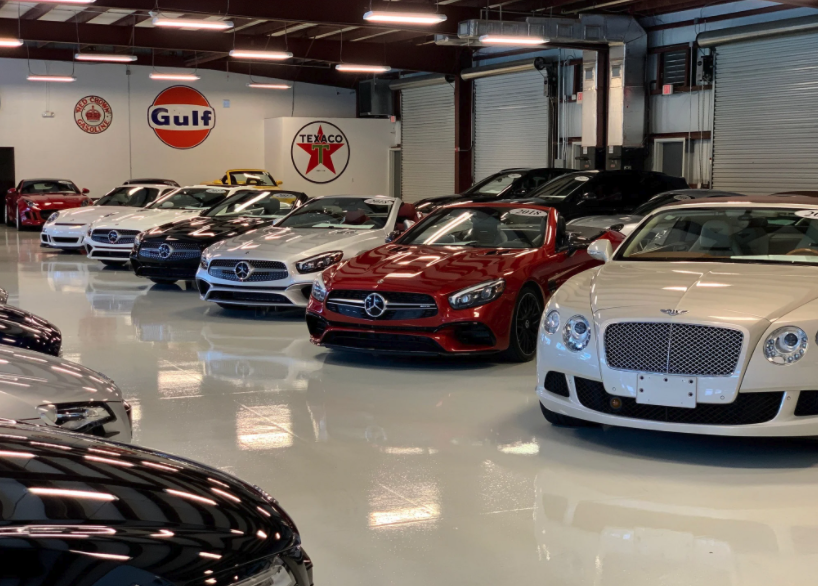The luxury car dealership industry is undergoing a rapid transformation, driven by advances in technology, changes in consumer expectations, and the rising importance of online platforms. The days when car dealerships operated in isolation, relying on in-person interactions and traditional marketing methods, are fast becoming a thing of the past. In the digital age, luxury car dealerships are adjusting their strategies to meet the growing demands of tech-savvy consumers and to stay competitive in a rapidly changing landscape.
This blog post will delve into the factors driving this transformation, examining how digital tools and shifting consumer behaviors are reshaping the industry. We’ll also explore the role of luxury car dealerships in the future and the ways they can adapt to meet these challenges.
The Shifting Dynamics of the Car Buying Experience
Car buying has traditionally been a physical experience, with customers visiting dealerships to interact with sales staff, test drive vehicles, and finalize their purchases. However, the digital age has drastically altered this model, particularly in the luxury car market. With the advent of e-commerce, social media, and digital advertising, customers now have access to an overwhelming amount of information about luxury vehicles without ever stepping foot in a dealership.
This has given rise to a shift in the buying process, where initial research and comparisons are done online, and the role of the dealership has evolved from being the central hub of information to a service-oriented business that enhances the customer’s journey.
Today’s buyers are empowered with a wealth of data at their fingertips. They can access customer reviews, expert opinions, virtual showrooms, and even engage in live chat with dealership representatives from the comfort of their homes. This has made it essential for luxury car dealerships to create an online presence that provides a seamless and informative experience. Customers can now research vehicles, read reviews, compare prices, and even schedule test drives, all online. However, while online research has become the norm, the final decision often still involves a visit to the dealership to finalize the deal and test drive the car. The challenge for luxury car dealerships is to create an online experience that complements the in-person visit, providing all the necessary tools and information that help customers make an informed decision.
The Growth of Online Car Buying
The rise of online car buying has been one of the most significant trends in the automotive retail industry over the last decade. While buying a car online was once considered a risky or unconventional option, it is now becoming the norm, even in the luxury car market. According to recent studies, a growing percentage of luxury car buyers are now willing to purchase their vehicles online. Factors such as convenience, transparency, and the increasing ability to complete the entire process digitally have made online car buying an attractive option for many consumers.
In the past, buying a luxury car involved a visit to a dealership to meet with a sales representative, view the vehicle in person, and negotiate terms. However, luxury car dealerships are increasingly embracing e-commerce, allowing customers to complete their purchase online. The shift to online buying has been fueled by advancements in digital tools that enable consumers to browse virtual showrooms, explore detailed specifications, and compare prices from the comfort of their homes. Some dealerships now offer the ability to complete the entire purchasing process online, including applying for financing, finalizing paperwork, and even scheduling delivery.
The impact of online buying is significant, as it forces dealerships to rethink their strategies. For example, luxury car dealerships must ensure that their websites provide a smooth and user-friendly experience that allows customers to browse, customize, and make purchases without feeling overwhelmed by technicalities. Dealerships are also focusing on making their websites mobile-friendly, recognizing that many customers now browse and shop for cars from their smartphones or tablets.
Moreover, online tools like virtual consultations, live chat, and video tours are enhancing the digital experience for luxury car buyers. Sales representatives are leveraging video calls to showcase the features of different cars, answer questions, and guide customers through the buying process. These virtual consultations allow dealerships to connect with customers in real-time, offering the personal touch that has traditionally been the hallmark of in-person sales while embracing the efficiency and convenience of digital interactions.
The Role of Social Media in Luxury Car Dealerships
Social media has emerged as one of the most powerful tools for luxury car dealerships to connect with potential buyers and promote their vehicles. Platforms like Instagram, Facebook, Twitter, and YouTube allow dealerships to showcase their cars in a visually compelling manner, creating an immersive experience that aligns with the aspirations of luxury car buyers. The ability to share high-quality photos, videos, and behind-the-scenes content has made social media an indispensable marketing tool for dealerships.
For luxury car dealerships, social media isn’t just about posting attractive images of cars – it’s about building a brand identity and engaging with customers on a deeper level. These platforms provide an opportunity to create a narrative around a dealership’s offerings, telling stories about the history of the cars they sell, the craftsmanship behind each model, and the lifestyle that comes with owning a luxury vehicle. By creating visually striking content and leveraging the power of storytelling, dealerships can foster a stronger emotional connection with potential customers, which is particularly important in the luxury market.
In addition to showcasing cars, social media platforms are increasingly being used for customer engagement. Luxury car buyers are drawn to brands that align with their values, and social media provides an opportunity for dealerships to communicate their commitment to quality, innovation, and customer satisfaction. Through regular updates, customer reviews, and user-generated content, dealerships can build trust and credibility, essential components in the luxury car market.
Luxury car dealerships are also taking advantage of influencer marketing, where popular figures in the automotive or luxury lifestyle space promote their vehicles. By collaborating with influencers who share their brand values, dealerships can increase their reach and visibility among affluent consumers.
Personalized Customer Experiences in the Digital World
Luxury car buyers expect a high level of personalized service, and the digital age has only heightened these expectations. Today’s consumers want more than just a product; they want a personalized experience that caters to their unique preferences and desires. Luxury car dealerships are rising to the challenge by using customer data and advanced technology to offer tailored experiences that match individual tastes.
Through the use of customer relationship management (CRM) systems, dealerships can track a customer’s interactions, preferences, and past purchases. This data allows dealerships to personalize their marketing campaigns, providing customers with information that is relevant to their interests. For example, if a customer has previously shown interest in a specific model, the dealership might send them a personalized email with updates on that vehicle’s availability, new features, or price changes. Personalized recommendations are becoming an increasingly important part of the online car-buying journey, with many luxury car dealerships integrating machine learning algorithms to suggest models based on the customer’s browsing history and preferences.
Additionally, luxury car dealerships are enhancing their online experience with virtual consultations, where customers can receive one-on-one guidance through video calls or live chat. These personalized consultations allow customers to ask questions, view detailed features of a vehicle, and discuss pricing options without ever leaving their home. Many dealerships are also offering virtual tours of their cars, where customers can explore every angle of the vehicle in high definition, virtually “walk” through the interior, and experience features like the infotainment system.
The Importance of Customer Service in the Digital Age
While digital tools and platforms are revolutionizing the luxury car buying experience, customer service remains one of the most important aspects of the luxury car dealership’s value proposition. However, the definition of great customer service has evolved in the digital age. Customers no longer expect to only interact with a dealership in person; they want to engage with the brand across various digital touchpoints, including social media, live chat, email, and mobile apps. In the digital age, luxury car dealerships must offer a seamless experience that connects with customers on every platform they use.
To meet this demand, luxury car dealerships are investing heavily in customer service technology. AI-powered chatbots, for example, are being used to handle initial inquiries and provide customers with quick, automated responses to common questions. However, the role of the human sales representative is still crucial. Buyers expect to be able to speak with knowledgeable and personable sales staff, whether in person or through digital channels. Dealerships that offer timely, responsive, and personalized customer service are the ones that will thrive in the digital age.
Future Trends: What’s Next for Luxury Car Dealerships?
As we look toward the future, several trends are likely to continue shaping the role of luxury car dealerships. The integration of emerging technologies such as artificial intelligence (AI), virtual reality (VR), and augmented reality (AR) will further transform the way customers experience the car-buying process. For example, AI-powered systems will continue to improve personalization, while VR and AR will offer new ways for customers to engage with cars before making a purchase.
Additionally, as electric vehicles (EVs) become more popular, luxury car dealerships will need to adapt their offerings to meet the growing demand for electric luxury cars. Dealerships will need to ensure that they have the infrastructure in place to support the sale, maintenance, and repair of EVs, which may require new training for sales staff and technicians.
Sustainability will also become a more significant factor in consumer decision-making. Luxury car dealerships will need to find ways to showcase their commitment to sustainability, whether through offering eco-friendly vehicles or implementing environmentally responsible practices in their operations.
Conclusion: Adapting to the Digital Future
The digital age has transformed the luxury car dealership industry in profound ways, and the future holds even more opportunities for innovation. Luxury car dealerships are increasingly embracing technology to offer personalized, seamless, and engaging customer experiences that meet the needs of modern buyers. Those who can adapt to these changes and stay ahead of the curve will continue to thrive, while those who resist innovation risk becoming irrelevant. The key to success for luxury car dealerships in the digital age lies in finding the perfect balance between embracing technology and maintaining the high level of service and personalization that luxury buyers expect. The road ahead may be challenging, but it is also filled with exciting possibilities.

